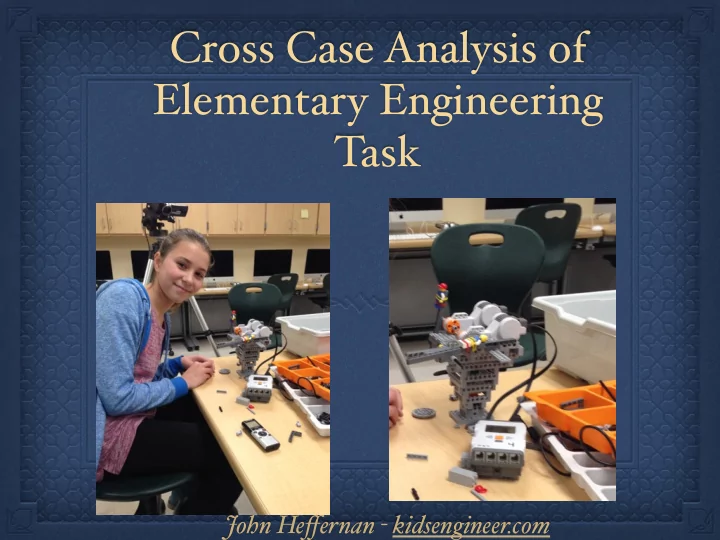

Cross Case Analysis of Elementary Engineering Task John He ff ernan - kidsengineer.com
Problem Statement Increasing academic focus resulting in loss of designerly play including engineering ( Zhao, 2012 ) . High need for diverse STEM workforce ( Brophy, Portsmore, Klein, & Rogers, 2008 ) . Start at elementary ( Cunningham & Hester, 2007 ) Children natural builders Motivating, increase STEM pipeline Integrate math and science Problems solving, modeling, co lm aboration
Research Questions Do grade 2 and grade 6 students’ engineering design processes and final products di ff er? If so, what are the specific di ff erences? Do male and female students’ engineering design processes and final products di ff er? If so, what are the specific di ff erences? If di ff erences are not seen by gender and grade level, what relationships do explain the di ff ering final products and engineering design processes of elementary students?
Literature Review
Existing EDP Research “While much is known about the design processes of older students and experts, there has not been a thorough and in - depth study of elementary student design processes and it is unknown if and how the conclusions and recommendations of these studies apply at the elementary level.”
Portsmore ( 2011 )
Initial Conceptual Framework
Methodology Qualitative, Cross Case, Cross - Sectional Semi - clinical video interview ( Ginsburg, 1997 ) Talk aloud protocol ( Ericsson & Simon, 1980 ) Filmed six second grade student and six grade six students doing same open - ended engineering task of amusement park ride with age - appropriate LEGO robotics materials and cra fu materials A lm students started with curriculum in K Qualitative analysis of EDP , finished rides, and EDP related codes and activity
Coded and Segmented Sample Girl 5 Segmented Coded Example [00:32:41] [EVALUATE] { moving} [00:32:49] [PLAN] { no_acHvity} Researcher: Yeah. There's always a challenge. [00:32:51] [PLAN] { searching} Girl 05: Hmm. Trying to think about this. [00:32:57] [RESEARCH] Girl 5: If I have this, that, that'll be upright. Yeah, that seems like it'll work. If I put one of these on each, I hope this will work. Put this on that, and that will run with ... [00:32:53] { connecHng} [00:33:22] Girl 05: How am I going to connect that? It'll be like ... [00:33:26] { moving} [00:33:28] [BUILD] { connecHng} Girl 05: Yeah, okay. Researcher: Great idea. [00:33:33] { measuring} Girl 05: Okay, where did my middle ... [00:33:37] Girl 05: Yeah. Then it'll ... [00:33:38] { connecHng} [00:33:40] [EVALUATE] { moving} [00:33:42] Girl 05: Weird.
Low complexity, low tools
Medium complexity, medium tools
Medium complexity, Low* tools T ools a mix of high and low, close to medium overa lm
High complexity, low tools
High complexity, high tools
Low complexity, low tools
Low complexity, high tools
Look at graphs especia lm y outliers: •Girl 5, Boy 5 - dense, mix of phases throughout •Boy 3, Girl 6 - build away! •Girl 3 - DNF , ongoing research and planning, which never resolved issues, serial building did not work for her •Girl 8 - “idealized” EDP - plan and build
Resources johnhe ff ernan@verizon.net Kids Engineer - http://www.kidsengineer.com/ Elementary Engineering - Sustaining the Natural Engineering Instincts of Children
Recommend
More recommend